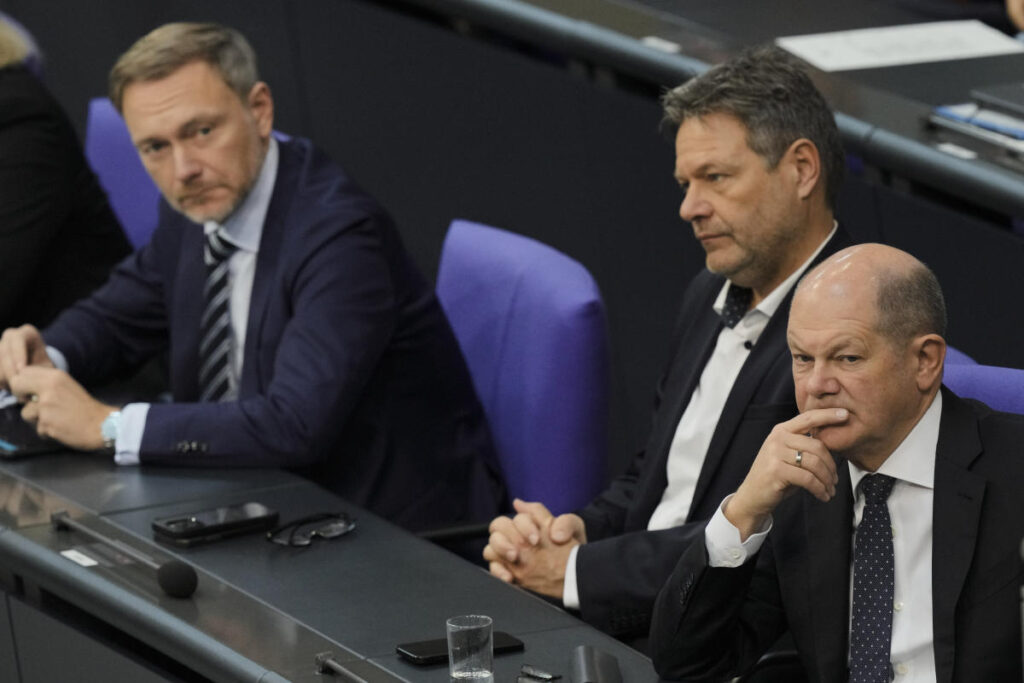Germany’s economy is currently facing significant challenges, and the governing coalition under Chancellor Olaf Scholz is struggling to find effective solutions amidst internal disagreements. As the country grapples with stagnation expected to affect growth into 2024, the coalition’s lack of consensus raises concerns about its ability to govern efficiently in the 11 months leading to the next election. The country’s economic difficulties stem from external pressures and internal obstacles such as bureaucratic red tape and a shortage of skilled labor. Finance Minister Christian Lindner aptly noted that while there is no lack of ideas to improve the situation, agreement on how to proceed is severely lacking among the coalition members.
The coalition itself is composed of three distinct parties: Scholz’s center-left Social Democrats, the environmentally motivated Greens led by Vice Chancellor Robert Habeck, and Lindner’s pro-business Free Democrats. Initially united by their ambition to modernize Germany, deep ideological divisions have emerged, especially concerning economic policies. While the government managed to address immediate crises, such as the energy supply issues prompted by Russia, the discord within the coalition has led to perceptions of dysfunction and ineffectiveness. The growing rifts have manifested in various disagreements, including recent proposals by Habeck for increased state investment that were summarily rejected by both Lindner and Scholz.
At the center of the coalition’s challenges are fundamental differences regarding fiscal policy. The leftist factions advocate for substantial state investments and reject cuts to welfare programs, while the Free Democrats adamantly oppose any tax increases or modifications to Germany’s strict debt limits, insisting on austerity measures instead. This ideological clash has complicated the formulation of the national budget, especially following a recent court ruling that invalidated a repurposing of COVID-19 relief funds. The resulting budget debates have been contentious, leading to protests from farmers upset over subsidy cuts and highlighting the government’s struggles.
Despite an attempt in July to reach a budget agreement that focused on defense spending and affordable housing initiatives, discord persisted within the coalition. The government has experienced delays, intensifying friction among the parties and casting doubt on their governance capabilities as they head into a critical parliamentary deadline. Opposition leaders are vocal about the government’s ineffectiveness, with Friedrich Merz suggesting that the coalition is no longer capable of meaningful action. The weakened state of the governing parties and their shifting support in the polls further complicates their political landscape.
As the coalition navigates its internal disputes, concerns about the future of the government loom large. The ruling parties continue to face pressure as no significant improvements to the economy seem to be on the horizon, and any responsible movement forward appears stymied by infighting. While Scholz has advocated for unity among the coalition to fulfill their mandate, the lack of collaboration and coherence in action raises the question of whether the coalition can maintain its integrity until the election or whether early elections may become a reality.
Ultimately, this period of discord represents a broader challenge for Germany’s governance as it seeks to navigate pressing economic issues while maintaining political stability. The coalition’s inability to reach consensus on key policy areas has not only impeded timely action but also weakened the public’s confidence in their leaders’ capabilities. As the deadline for the national budget looms, it remains unclear whether the coalition can set aside their differences to present a cohesive strategy that addresses the economic challenges and restores faith in the government’s effectiveness. The coming months will be crucial in determining both the pathway forward for Germany’s economy and the survival of Chancellor Scholz’s government.

